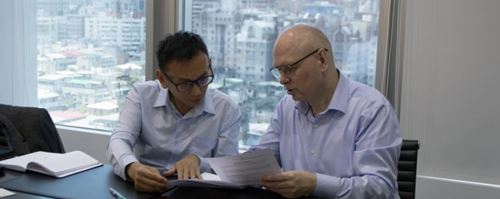In December 2019, Fred. Olsen Ocean opened its Taiwan office to support the country’s growing offshore wind industry and act as a central hub to service customers across the APAC region. Things have progressed well; however regular seismic activity means that operations in Taiwanese waters can be a constant challenge. We spoke to Axel Wullf Wathne, Principal Engineer of Fred. Olsen Windcarrier (FOWIC) in Taiwan, to understand more about the difficulties this poses, and what he is doing to overcome them.
Shaky foundations
“Seismic activity is well known to be a particular issue in Taiwan,” says Axel. “While this is well understood regarding construction onshore, how this relates to offshore operations using a jack-up installation vessel is less well known. It requires a specialist approach to offshore engineering and is the basis for why FOWIC’s planning operations here are different than in Europe.”
Seismic activity produces cyclic ground motions that can transfer to a jack-up installation vessel’s legs and structures when elevated. This is a problem that, if not managed properly, can lead to structural over-utilization and equipment failure on board. These ground motions can also result in soil liquefaction and cyclic softening, which can greatly reduce the bearing capacity of the seabed and cause vessel instability during operation.
In the worst cases, these conditions can increase ‘punch-through’ risks, which is when one or more of the vessel’s legs suddenly sinks deeply into the seabed due to a sudden reduction in soil bearing capacity. This can be very dangerous, with the vessel losing stability entirely or even capsizing.
Safety through risk management
“To overcome these challenges, FOWIC applies a detailed risk management approach to identify, evaluate, quantify, and mitigate the risks associated with seismic activity,” Axel explains. “This incorporates both desktop studies to understand the probabilities and consequences of a seismic event to our type of operation, and operational mitigative measures implemented in planning and execution. This allows us to make sure that all operations are performed at as low as reasonably practicable (ALARP) risk levels.”
These mitigative measures could typically involve working to reduce vessel exposure time out of water, working at reduced airgap, and increasing operational efficiency to limit crane and lifting exposure times.
In addition, FOWIC is partnering with leading geotechnical experts on seismic activity and soil liquefaction to better understand soil behavior in the region, as well as with consultancies specialising in structural dynamics to help predict and safeguard the seismic loads experienced by installation vessels in an elevated condition.
Right now, we are building a stable platform for growth for our partners in APAC, with a strong team and high-performance vessels, delivering precise marine operations.
- Axel Wullf Wathne, Principal Engineer, Fred. Olsen Windcarrier
The importance of keeping ‘an open mind’
In Europe (or any other region with a low seismic risk), FOWIC would verify its installation vessels against storm survival criteria and allow them to remain on site in an elevated condition during periods of adverse weather. Typically, working in this way is known as ‘unrestricted operations’.
In Taiwan, however, there are practically no conditions for which the vessel can safely operate in this way. This puts stricter requirements on the planning of marine operations based on safe weather windows for both vessel and installation operations, which need to be well coordinated and managed.
“We meet projects in the region with an open mind, as the seismic risk management approach will typically result in operations being executed differently than in Europe,” says Axel. “By adapting to the conditions in the right way, we can deal with the challenges, reduce the risks, and keep the project on track. Not only does this help to protect people and assets, but we are building an invaluable pool of experience and knowledge that we can bring to our customers’ future projects.”
Building a stable future
Even against these natural obstacles, FOWIC is helping the offshore wind farm industry gather pace across the APAC region, with Taiwan leading the way.
FOWIC currently has one installation vessel working in the region with a second joining shortly, allowing it to take an increasingly active role in offshore wind development as a reliable service partner for transport and installation, and for operations and maintenance.
“Right now,” says Axel, “we are building a stable platform for growth for our partners in APAC, with a strong team and high-performance vessels, delivering precise marine operations. There is great potential and we look forward to what the future holds.”
See our Taiwanese page
